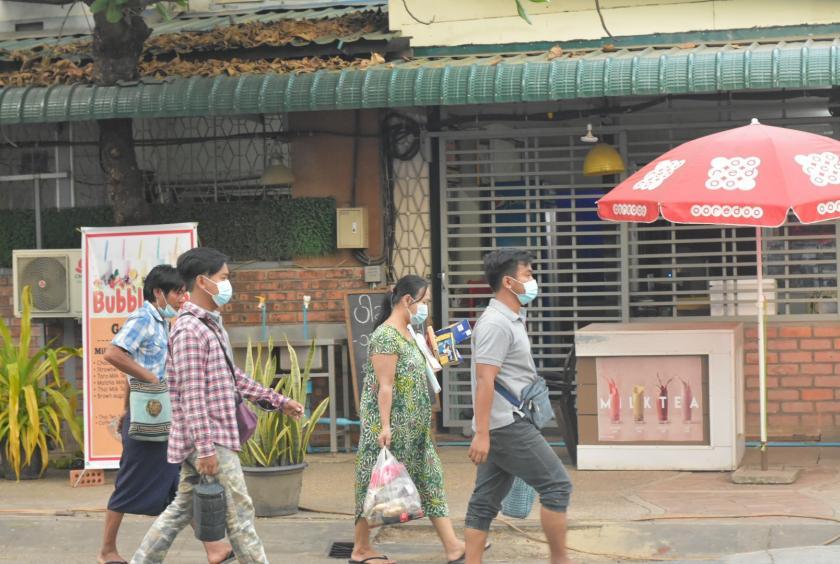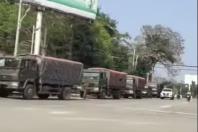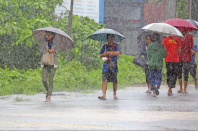
Myanmar is now under threat of Covid-19 third wave. Its economy had already been battered by the pandemic's second wave.
Business owners, since the beginning of the current turmoil, had voiced out that businesses are facing challenges such as banking troubles, the black market for cashing out bank transfers and so on.
International businesses had also either left or are preparing to leave due to the current turmoil, difficulties accessing raw ingredients as well as producing finished products as well as sluggish flow of cash.
(1)
According to the Manufacturing Purchasing Manager's Index, published by Nikkei in June 2021, Myanmar's manufacturing sector had steadily declined due to the depreciation of Kyat as a currency, the dollar to Kyat black market as well as general cost hike in almost every part of the logistic chain.
Further decline, such as lowering amount of orders, are driven by the current ongonig turmoil, according to the PMI's data. Many that participated in putting together the report also pointed out that businesses that had already been hit by Covid-19 and shuttered temporarily, had continue to remain inoperational or slowed to a standstill.
IHS Markit's economist Shreeya Patel says that cost of manufacturing rose rapidly as delivery charges, price of raw ingredients and the foreign currency market remains instable as well as restrictions on cash withdrawal.
Myanmar's PMI was at 39.7 in May and climbed to 41.5 in July, showing that the manufacturing sector had been seeing decline for 10th consecutive months.
While the report indicates that Myanmar's PMI index both rose and fell within those 10 months, the last weeks of July saw the plummet of local demand and new orders. This has been atrributed to the rise of operational costs as well as restrictions on obtaining cash.
This is the lowest it had gone for Myanmar for the PMI's life so far of five and a half years.
The report also highlights the steady decline of human resources, with comments by economists in the reports that this occurred as workers, by force or through self resignation, had quit their jobs to return home.
While the inflation of operational costs had increased steadily, it had lowered from the peak the report showed during May. However, the same problems continue to plague the economy.
"There are some results we can discern from the data and that is that while the manufacturing capacity, employment opportunities and overall purchasing power of company is decreasing, the inflation of operation costs softened after May. Companies are hopeful that the situation will improve so there are some positivty. Companies are waiting for the local demand to pick back up and for the currency related issues to be solved," said Shreeya Patel.
(2)
Many industrial business owners say that the demand for cash is causing difficulties between factories and wholesalers of raw ingredients.
"Those that sell raw ingredients want cash. Since businesses can't give cash, there are difficulties ," said an industrial business owner.
Another factory owner also said that it had been over a year since Covid-19 had spread and most businesses are worried whether the economy can overcome damages already done to social, healthcare, education, service industry amongst other problems for the economy.
"It was returning to normal for the economy especially since restrictions were eased regarding Covid. Some had submitted proposals regarding investments also. So it is not that much of a terrible situation. It was bad two, three months ago. Some businesses managed to restart around the beginning of June. Many shops reopened in Yangon so despite challenges, businesses came back to life. It won't be that terrible for 2021 June until end of the year. It is not a good situation to be in but it is not the worst," said the Union Minister of Investment and Foreign Economic Relations U Aung Naing Oo.
Covid-19 had battered the world's economy at large. Social distancing amongst other measures also meant that some businesses simply cannot operate.
While the world managed to survive the pandemic, it is sure to be struck by one of the worst economic collapse. One of the most immediate problems would be the lack of employment for people.
The rate of joblessness as well as the number of unemployed persons will be the highest countries have ever seen.
(3)
When Covid-19 first struck Myanmar, attempts at alleviating the damages done were carried out ranging from Covid-19 loans, tax reductions as well as stimulus packages.
The committee responsible for curing the economic ills of Covid-19 had said that businesses that had taken out Covid-19 fund are unable to repay within the allotted time frame and had further requested extension of the loan period.
The Minister for Investment and Foreign Economic Relations Aung Naing Oo had said that there were many cases in each state and region where business owners had requested extension of the loans, to hold the repayment of interests itself and more. He says that discussions were held to negotiate the best possible course of action between the government and businesses.
The Covid-19 loans, to be taken from the overall Covid-19 fund, is a loan where government only takes one percent interest for a time period of one year. It started in April 9 of 2020.
The State Administration Council had issued an announcement for the extension of the loan period by another six months so as to smooth out the difficulties faced by businesses.
Stimulus packages and other supportive action were also taken as per the Covid-19 Economics Relief Plan (CERP). The Ministry of Planning and Finance had announced that it had so far used 1049 billion Kyat for loans and over 940 billion Kyats for stimulus packages and other support sent out to households across Myanmar.
Despite such actions, industrial zone management committes have said that factories are beginning to shut down as the environment gets more hostile for businesses to prosper.
"When Covid first started, government gave out loans. It reduced the interests and taxes. But businesses still need to repay those loans and now the third wave of Covid-19 is here. During this period, it's not just one problem. It's a whole load of problems. Our businesses are floundering about, struggling.
There are many businesses that has to shut down simply because they could not withdraw their money from the banks. If businesses cannot withdraw money from banks to pay for the staff, factories will definitely have to shut down. This is not even counting things like problems in keeping the whole operation running or even buying raw ingredients. Just the bank and cash problems alone cause the manufacturing output to drop. Covid-19 plus the current situation means that more and more businesses are growing smaller by the day," said a business owner.
Faced with shut downs and closures, many business owners had voiced their need for stimulus packages or something to create a situation where all sectors can continue to survive, if not thrive.
"The starvation of cash is a huge problem. We cannot withdraw money from banks whenever we want. And we cannot carry out transactions through bank transfers. It is a horrible situation. If all of these cannot be solved in time, it will be extremely difficult for businesses to recover," said another business owner.










